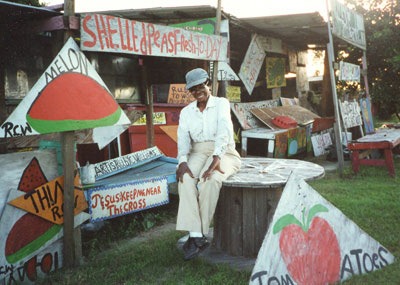
The Truth Sayer
Written by Karen Sampson | Posted by: Anonymous
Cindy Kleine does not take people at face value. She has a gift in being able to see beyond the surface, and as a filmmaker she has been using this ability to make documentaries for the past 25 years. Passionate about telling stories that come straight from life, she aims not to send a message about a particular topic, but rather to uncover the deep psychological and emotional factors that influence people and their behavior.
"I never think of my films as having messages," she says. "They’re always more of an inquiry — an investigation — of what I find compelling and fascinating about people and relationships. What I want to do is reveal the truth, or a truth."
Truth, however, is not easily defined; it is subjective, as Kleine’s recent film "’Til Death Due Us Part" so aptly demonstrates. With this three-part film (the second part of which she is currently editing), Kleine investigates how men and women experience the institution of marriage in entirely different ways. "One truth this film speaks about is that there is no truth," she explains. "In other words, there are only the stories each person invents about themselves and their history. But each person’s story is completely different, even when they’ve spent their entire lives together, sleeping in the same bed every night. Even those stories and memories change all the time."
The very fact that Kleine strives to uncover the things people hide from each other — and themselves — requires that her films be extremely personal, and she does not shy away from turning the camera on herself and her own life; the unhappy 55-year marriage she examines in "’Til Death Due Us Part" is that of her parents. Making this film was, she says, "more cleansing and clarifying than painful — like an exorcism," but she also admits that cutting so close to the bone was sometimes difficult. "Certainly focusing this much energy and time on the bizarre and unhealthy aspects of my upbringing has, at times, been painful."
In her latest film, "Inside Out," Kleine examines the strong correlation between pain and creativity, one that she recognizes in her own life. NewEnglandFilm.com recently caught up with her at her part-year home in Truro, Massachusetts, to talk about her teaching background, commercial success, and "Inside Out," which will be screened at the Provincetown International Film Festival this month.
Karen Sampson: What made you decide you wanted to be a filmmaker?
Cindy Kleine: I was a photography major at the School of the Museum of Fine Arts (SMFA) in Boston, and found myself wanting to make the pictures move. My boyfriend at the time was majoring in film (Visual Studies) at Harvard. He leant me his 16mm camera, showed me how to use it and how to edit, and from then on I was hooked.
KS: Can you talk a bit about your teaching background?
Kleine: When I was 25, I got offered a teaching job at Boston College. I taught there from 1985 until 1997, with other teaching jobs during those years, too. My last teaching job was at The New School in New York, in about 1999. I’ve since "retired" from teaching, but I still teach workshops from time to time, most recently in Provincetown and at the University of Hawaii in Honolulu.
What I loved about teaching, and what I miss, is the pleasure of working with wonderful, talented students, turning them on to films they’d never otherwise see, and helping them to realize their vision. I also miss being around young people; I learned [from my students] as much as they learned from me.
KS: Your films are mostly short documentaries. What attracted you to this genre?
Kleine: I found that what I was passionate about expressing was always nonfictional — straight out of my life, or the lives of others who had touched me. My documentaries are never traditional docs, though; they’re more arty, personal, weird, unusual. . .however you might put it.
The length, I suppose, has more to do with what I have to say, rather than being a choice, but I find my films are getting longer and longer — "Inside Out" is 45 minutes, and the one I am working on now is feature length. I guess the older I get, the more I have to say, and hopefully, the more wisdom I have in saying it! I’m happy about this because there is an inherent problem in distributing short films, especially when they’re too long to be classic "shorts" and too short to be considered features.
KS: Do you feel that making documentaries is as creative an endeavor as making feature films? Why or why not?
Kleine: I think they are two completely different forms of expression, and unique talents are required to do either of them well. Because I make docs, narratives seem more difficult to me, though I love excellent well-made narrative films, and have often dreamed of making them. The work involved seems daunting to me though, and my standards are so high that I would always be afraid I wouldn’t be able to live up to them.
KS: Do you do all of the work (camera, editing, sound, etc.) on your films or do you work with a crew?
Kleine: I used to do all the work myself — shooting, sound, editing, writing, producing. With "Inside Out," however, I worked with an editor (for a brief period actually two editors), and after a certain point, a cameraperson. I needed an editor because the amount of footage was way more than I’d ever handled before (about 80 hours), and the film was really difficult to edit for many reasons.
Now that I’ve worked with a good cameraperson, I can never go back. The more experience I have, the more I am able to acknowledge my own limitations and admit the fact that I just can’t do everything.
KS: How important is commercial success to you?
Kleine: If I were to make a wish list, it would be very important. I’d love for my films to be more widely seen, and I’d love to make some money with them. But since it’s not something I’ve ever had, and I’ve been making films for 25 years, I guess it’s not all that important! In other words, if I wanted to, I could make "commercial films" — docs for TV, etc. — but I’m not willing to compromise my aesthetic judgment for that purpose specifically, so it hasn’t happened. My aesthetic tastes and what is considered "commercial," in this country at least, are apparently not one and the same thing.
KS: In your experience, what is the creative climate like for filmmakers in New England?
Kleine: I was nurtured and "reared" as a filmmaker in New England — Boston, specifically — and learned everything I know there from amazingly gifted teachers and filmmakers. Boston, and New England in general, supports my work in a way other places in the country don’t. There is an atmosphere here that is very supportive of truly independent works like mine. People are much more open to it.
KS: Your films have been shown at a number of prominent festivals around the country. Can you talk a bit about the festival circuit for documentaries?
Kleine: Things are certainly different than when I started sending work to festivals 20 years ago. More and more film festivals are now not only showing docs, but also placing greater emphasis on them. Also, there are a lot more festivals. It’s a great way to have work shown (often the only way) and to meet other like-minded documentary makers. Festivals always give me an important sense of community. We forget, huddled over our little editing machines obsessing about our own personal subject matter, that there are thousands of other nuts out there doing the same thing. It’s comforting to be reminded of that.
KS: Your most recent film, "Inside Out," introduces viewers to six very eccentric characters who create their own unique forms of art. Tell us about making this film.
Kleine: In 1999, while spending the summer in Santa Fe, I came across a yard that had a display of baby doll heads on sticks, and I became fascinated with exploring the idea of people who use their personal space as their own gallery. I got a photographer (Polly Brown) on board, and she and I spent two years traveling the country taking photos and footage. We found (mostly through word-of-mouth) 28 subjects altogether.
At the time I shot the footage, I didn’t know what I was going to do with it, so when I decided to pull it together as a film I really struggled with the editing. There have been 100 incarnations of this film; at one point it was a feature film with animation — a whole elaborate thing.
KS: Can you talk about the role creativity has played in the lives of the people you present in "Inside Out"?
Kleine: Coming from an upper middle-class background with all the advantages, education, etc., I have always had this incredible battle with my creative work. Yet these people — most of whom are poor and have had incredibly tragic lives — don’t struggle with their work at all. Creativity, for them, is a way of healing. It is how they find peace and solace and the strength to go on.
KS: In your synopsis of "Inside Out" you say the film is meant to offer us hope. Can you expand on this?
Kleine: I don’t think it is an accident that I began working on this at a time when I began to despair about the political climate in this country. The characters in this film are meant to stand as beacons of hope by showing that no matter how bad things get, there is a way out. These people are all finding their own positive way to get by, and I believe that we — each one of us — can use our creative energy to solve any problem.
KS: You have said that making "Inside Out" was the hardest thing you’ve ever done. Are you happy with the results of all your hard work?
Kleine: In the end I am happy with it. It’s a strange, odd film, but very much what I wanted. It’s very much about the people who are in it — I gave it back to them.
'Inside Out' will be screened as part of the Provincetown International Film Festival’s 'Cape Visions: Shorts from Lower Cape Filmmakers' series on Saturday, June 18th at 5:00 p.m. and on Sunday, June 19th at 1:45 p.m.









